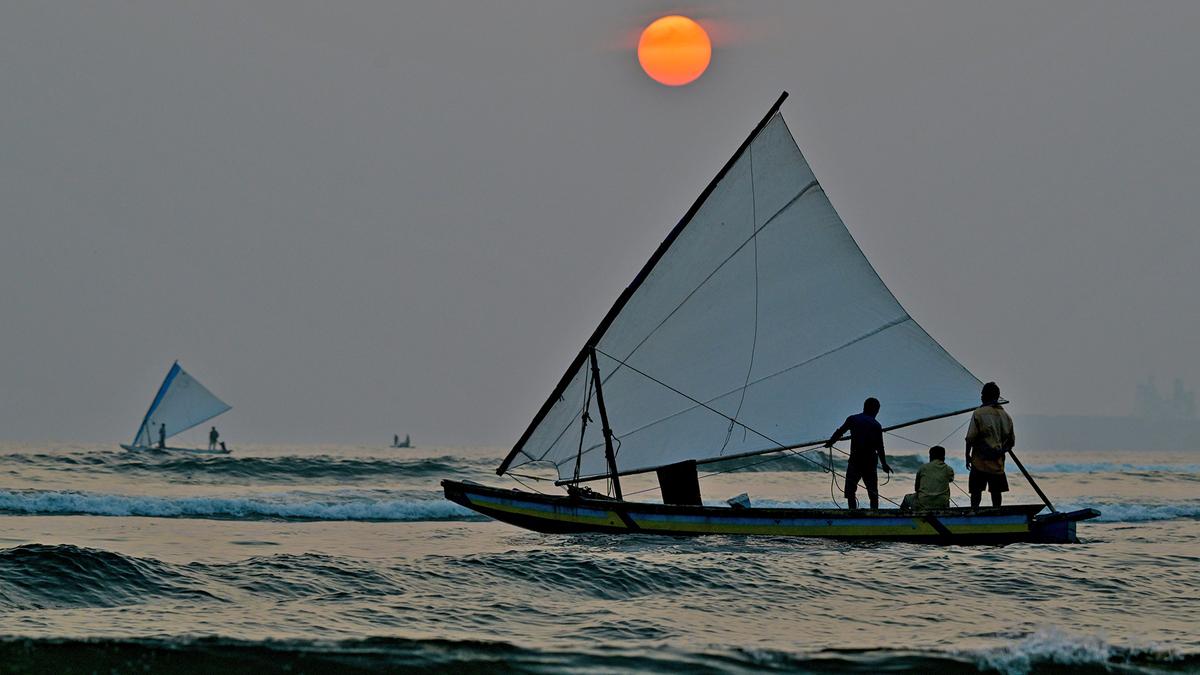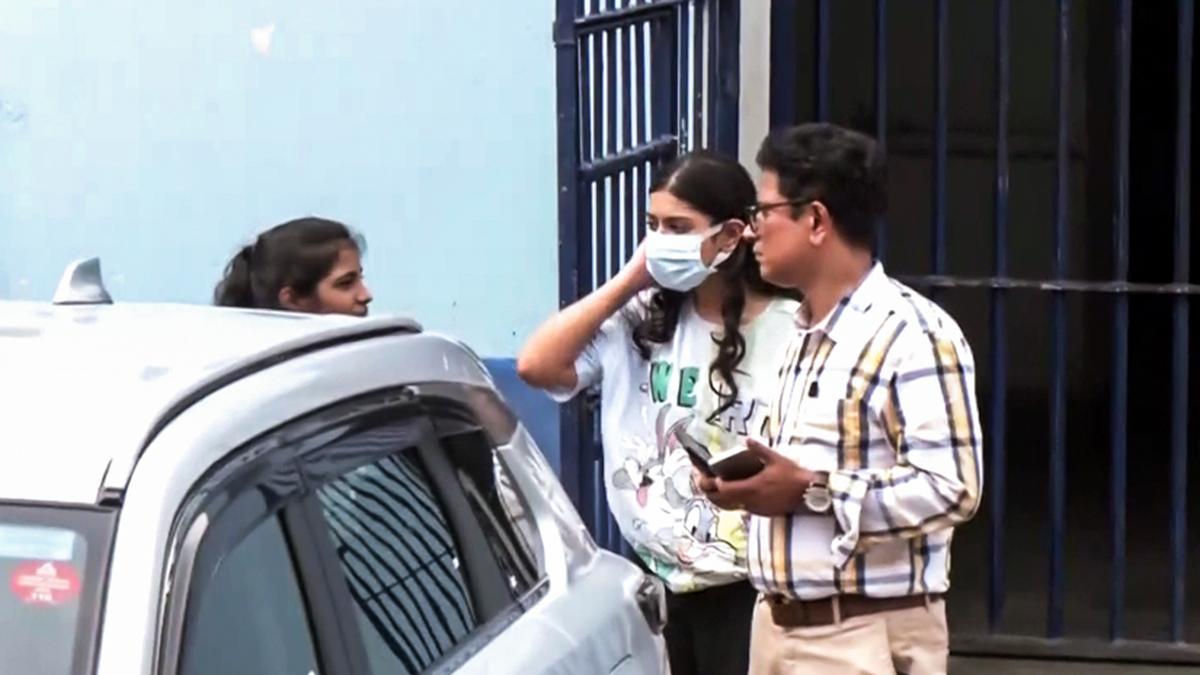Guntur district’s Tenali is often called the ‘Andhra Paris’, perhaps because of the presence of three canals of the Krishna river flowing through it, much like how three canals pass through Paris. Recently, however, this fabled Andhra heartland hit the headlines for a different reason altogether: a flagrant case of police highhandedness.
On May 26, Andhra Pradesh woke up to a viral video of two police personnel caning three youth in full public view. The disturbing video shows the youth — Doma Rakesh, Chebrolu John Victor (both 25 years old) and 22-year-old Shaik Karimulla — being made to sit on the road with their legs extended, while the officers caned them hard on their soles. One of them pinned Rakesh’s legs to the ground to ensure that he cannot move or shield himself while lashes rained on his soles. According to Rakesh’s family, he had a steel rod implanted in his leg after a fracture a few years ago.
The three men were arrested on April 24 following a complaint lodged by constable Kanna Chiranjeevi of One Town police station, who accused the three and one of their friends, Vemu Naveen alias Killer, of assaulting him under the influence of ganja while he was on duty and attempting to murder him with a knife.
Of the four accused, Naveen is reportedly on the run, and the remaining three were subjected to public humiliation and beating. The police action of resorting to physical violence in public reportedly to “teach them a lesson”, instead of following established legal procedures, has drawn widespread criticism.
Rule of law, paramount
Rights activists have condemned the incident, with bar associations and a few other organisations staging protests, demanding stringent action against the police personnel involved. “What happened in Tenali is totally unwarranted and illegal. The police should act in accordance with the rule of law,” said Justice B. Chandra Kumar, retired Judge of the High Court of the undivided Andhra Pradesh.

Rakesh’s parents Doma Vasu and Madhavi and his grandmother at their house at Ithanagar in Tenali of Guntur district. | Photo Credit: G.N. RAO
Citing the Code of Criminal Procedure (CrPC), which provides the guidelines for the investigation of crime, apprehension of the accused, collection of evidence, determination of guilt and punishment of the guilty, he said nobody should take the law into their hands. “Even under the British and the Nizam, there was a procedure to be followed. If the police are allowed to take law into their hands, then there will be no limit to it. The law should also apply to them, and those resorting to such acts are liable for punishment,” he said.
Leaders of marginalised communities and the Opposition YSRCP also condemned what they termed as the “law of jungle”, saying that Dalits have perennially been at the receiving end of torture and public humiliation.
To counter the allegations, the Police Department released a poster, stating that it was not an attack on Dalits. The poster says that on the night of April 24, the accused Naveen (Dalit) from Tenali, Rakesh (Dalit) from Tenali, John Victor from Mangalagiri and Karimulla from Mangalagiri attacked constable Kanna Chiranjeevi with a knife under the influence of ganja. They were booked on April 25 based on a complaint lodged by the constable. Departmental action would be taken against the police personnel who beat up the accused in public, the poster reads.
Members of Andhra Pradesh Human Rights Forum (HRF), however, find this poster most troubling. “We are aware of the police claims ... But none of those justify extrajudicial violence,” said G. Nageswara Rao, vice-president of AP HRF. Irrespective of the severity of the accusations, every individual is entitled to due process and protection from cruel, inhuman and degrading treatment, argues State secretary of the forum G. Rohith.
“The public nature of the beating suggests a deliberate display of dominance, intended to instil fear rather than uphold justice,” says Venkata Ranga Rao, general secretary of Bezawada Bar Association. He further cautions that it also underscores a dangerous trend of informal punishment, where the police act as judge, jury and executioner.
The poster also claims that except Karimulla, there are rowdy sheets against the remaining three and that each of them have no less than eight police cases against them.
The families of Rakesh and John Victor, however, challenge this claim. They say that though the two youth were booked, they have been acquitted in all the cases after having been proven innocent. They said the rowdy sheets against them were opened in the current issue.
The incident according to the youth’s families
According to Rakesh’s father Vasu and John Victor’s father Israel, their sons, along with two others— Vemu Navin and Karimulla, a bike mechanic from Mangalagiri — gathered at Pallekondavari street in Tenali on the night of April 24 for a banter after attending the birthday party of a common friend.
At that time, Constable Kanna Chiranjeevi came on a two-wheeler and demanded mamool (a form of bribe), claiming that he had been sent by the Circle Inspector. He also asked Naveen, who had been arrested in a ganja case before, why he was not attending counselling sessions.
John Victor, who is a lawyer, questioned the constable’s demand for the mamool, leading to an altercation. In the scuffle, the constable caught Victor by his collar and confiscated their mobile phones and vehicle keys and also snatched some money Karimulla had in his pocket, said Israel.
Vasu and Israel say their sons told them that nobody was hurt that night. The next morning, the constable came to their houses and detained their sons, saying that they had attacked and injured him with a knife and that the CI wanted to see them at the police station. “I saw a hand kerchief tied to one of his hands but did not see any sign of injury,” says Vasu.
The families of Rakesh, John and Karimulla say they came to know about the inhuman treatment meted out at their sons only after the video of it leaked after a month, on May 26.
According to their families, John Victor and Karimulla were picked up from Mangalagiri around 11 a.m. on April 25 in a car by constables Kanna Chiranjeevi and Ramesh Nayak, and they were thrashed in the moving vehicle. They were brought to the Two Town police station, thrashed in a room without CCTV surveillance and put in the lock-up, where they saw Rakesh.
The next day (April 26), the three of them were taken to a dilapidated police quarter behind the police station. At 4 p.m, they were taken to the Annabathuni Satyanarayana Samadhi, where other police personnel were waiting. They were made to sit on the road and beaten up while the CI video recorded the act. They were then taken back to the police station and spent the night in the lock-up. On April 27 (Sunday), they were taken to Linga Rao Centre in Ithanagar and thrashed again.
Israel says his son Victor John told him that the CI placed a button knife in his hand, made him open it in the presence of two other government employees and recorded it. By noon, they were brought back to the police station, where their faces were covered as the CI addressed the media on the issue. The same evening, they were produced before the judge at his residence and remanded to the Repalle sub-jail the same night.
Doma Madhavi, Rakesh’s mother, says the police torture could have dislocated the steel implant in his leg. “His fractured leg hadn’t healed fully.” Rakesh’s grandfather Nageswara Rao asks what would have happened if Rakesh, who works as a food delivery agent in Hyderabad, had been incapacitated for life. “Who would have taken the responsibility then?” he asked.
Disproportionate violence
Referring to the government’s claim that there is no caste angle to it, leaders of organisations like Kula Vyatireka Porata Samithi (Anti-Caste Struggle Committee), affiliated to the Communist Party of India (Marxist), say the fact that the police officers involved belong to the Scheduled Tribe and Other Backward Castes proves how institutional violence transcends caste when internalised oppression is at play.
“The pattern of who gets brutalised often follows caste and class lines even if the perpetrators don’t always belong to dominant castes. This also suggests that institutional culture enables and perpetuates violence disproportionately against the marginalised,” says A. Malyadri, State general secretary of the organisation.
He recalled the case of the illegal arrest, prolonged detention and custodial torture of Challa Subba Rao and Vadlapudi Samson, a Dalit farmhand, by police at Morusumilli village in Mylavaram mandal of NTR district in February this year and said it brought to the fore the indifference and blatant disregard for human rights by a section of the police officers.
He said Subba Rao and Samson were picked up by police on February 8 from the village, even before an FIR was filed, in connection with the murder of Kadiyam Srinivasa Rao from the neighbouring village of Mulakalapenta. The arrests were made based on a complaint lodged by the deceased man’s son, Kadiyam Pulla Rao, who said he suspected Subba Rao to be behind his father’s death, citing a land dispute between the two.
Malyadri said instead of presenting them before a magistrate, the two were confined and tortured, with Samson stripped and tied to a tree and beaten. While Subba Rao consistently refused to accept the charges, Samson, unable to bear the custodial torture, reportedly confessed to have killed Srinivasa Rao, said Malyadri.
The police later found that the real killer was Pulla Rao, and they quietly released Subba Rao and Samson, without even acknowledging their wrongful detention.
A committee constituted by the State HRF visited the village for an inquiry and demanded adequate compensation to Samson, who suffered severe physical torture and mental trauma, and action against the officers involved under relevant sections of the Bharatiya Nyaya Sanhita (BNS) and the SC/ST (Prevention of Atrocities) Act.
What can be done
Such incidents of police unleashing violence with impunity underscore the urgent need for active community engagement in conflict resolution and counselling. “Community engagement is critical for reformation of anti-social elements, as it serves as a bridge between individuals who have deviated from social norms and the society they must be reintegrated into,” said B. Keerthy, president of Vasavya Mahila Mandali.
The NGO, in collaboration with the Police Department, has counselled 8,600 eve-teasers between 2017 and 2020 within Vijayawada police commissionerate limits. “While the police play a vital role in maintaining law and order, their primary functions have been punitive and reactive in nature. They lack the specialised training and skills to counsell individuals involved in anti-social behaviour,” says Keerthy, adding that community engagement is imperative to address the root cause of anti-social behaviour and move towards sustainable and inclusive solutions.
Guntur Superintendent of Police Satish Kumar says that an inquiry has been ordered into the issue.
Meanwhile, the incident has acquired political overtones with YSRCP president Y.S. Jagan Mohan Reddy visiting the families of the three youth in Tenali and slamming the TDP-led coalition government in the State.
Responding to the issue, Minister for Home V. Anitha has ordered the Police Department to initiate a full inquiry into the incident and take appropriate action against those involved. She is also reported to have said that the police are tasked with controlling crime and that the department should be allowed to do its work.
Published - June 06, 2025 08:18 am IST



.png)
.png)
.png)
















 15 hours ago
5
15 hours ago
5








 English (US) ·
English (US) ·